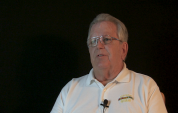5:09 | Nobody wanted to talk about it. Even his family had been affected by the relentless shame heaped on the war and the veterans of the war. But Terry Caskey was no baby killer. He had seen enough dying men working in Army hospitals in Vietnam to know what that war was really about. He coped by drinking until, inspired by the hero's welcome for Desert Storm vets, he organized a reunion. This began an upward path.
Keywords : Terry Caskey medic operating room technician Vietnam baby killer drinking Desert Storm reunion Creedence Clearwater Revival Rolling Stones physician's assistant (PA)

Ever since watching the old TV series Combat, Terry Caskey knew he wanted to be a medic. He knew he wanted to go to Vietnam, as well, so he could help soldiers survive if they were wounded. After his training, he had dual MOS's as a combat medic and operating room technician. He got his orders for Vietnam in July 1968.
After some OJT at the Fort Campbell military hospital, Terry Caskey flew off to Vietnam. When he stepped out of the airplane door, he was struck by the overwhelming heat and awful smell. Assigned to a MASH type field hospital in Phu Bai, he waited for days at Cam Ranh Bay for transport north.
There was a mortar attack going on when medic and operating room technician Terry Caskey arrived in Phu Bai. He was assigned to a field hospital where the flow of casualties and the enemy attacks were relentless. He could watch the rockets fire off from a nearby hilltop and track the contrail right into his compound. And as he ended an epic shift in the operating room, he emerged covered in blood. It was too much for a twenty year old to bear.
The first thing that happened to Terry Caskey when he was transferred to the 95th Evacuation hospital in Da Nang was a rocket attack that ruptured his eardrums. At least the facility was a step up from the field hospital in Phu Bai. The 95th was in a real building and had flush toilets.
There was water everywhere which meant that there were mosquitos everywhere which meant that Terry Caskey had malaria four times in Vietnam. His day at the hospital could be mundane or it could be terrible. He recalls a terrible day when a chopper full of dead and wounded Marines landed at the hospital.
It was long hours for the staff at the military hospitals in Vietnam. Terry Caskey recalls one wounded soldier who stepped on a land mine and underwent multiple amputations. Years later, seeing photos of that day set off a PTSD episode which resulted in him finally getting the needed help from the VA.
He had just had back surgery and malaria, again, when he flew home. The airliner had lost hydraulics and nearly crash landed in San Francisco. That was all bad enough but when Terry Caskey stepped off the plane, he was greeted by a long line of protestors who cursed him and spit on him. Not much of a welcome home.
The airport terminal was ventilated with bullet holes. That was what Terry Caskey saw when he got to Phu Bai. He was a medic and operating room technician working in a MASH type field hospital. The flow of wounded was immense and never ending.
In the operating rooms in Vietnam, they wore masks, of course, and when Terry Caskey met one of the nurses years later at a reunion, she recognized him by his eyes. The reunions help him cope with the memories of that time, like the case of the triple amputee whose life they saved but who was not yet safe from the enemy.
Anything that could distract him from the operating room was welcome. A USO show, playing ball, anything. Terry Caskey had to stay up for days, sometimes, to cope with the relentless stream of casualties in Vietnam. These days, the reunions keep him centered.